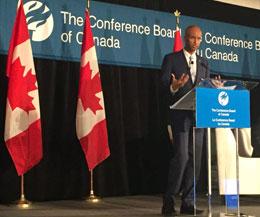Asian techies get a quick route to Canada

Asian techies aspiring to work and settle in Canada are set to get an easier pathway to achieve their dreams.
Canada is set to make the Global Talent Stream (GTS) programme, which offers a hassle-free and quick route to work in the country, a permanent scheme.
Applicants having a science, technology, engineering or mathematics (STEM) background, are set to gain the most out of this.
Under the GTS programme, processing of applications filed by sponsoring employees takes just two weeks. Those hired under the GTS route gain work experience in Canada, which will ultimately help them while applying for permanent residency under the Express Entry programme.
So far Indians are the largest group to be issued invites for permanent residency under the Express Entry programme. During 2017, 42% of the 86,022 people who received invitations for permanent residency, were Indians. During 2018 it rose further by 13% to 41,000.
“We are attracting some of the most highly skilled people of the world, through our global skills strategy,” the ToI report quoted Ahmed Hussen, minister of immigration, refugees and citizenship Canada (IRCC), as saying in the budget document, tabled recently.
Canada's burgeoning tech sector has led to the proposal to make the GST programme a permanent one. Since launch of the pilot project in June 2017, more than 2000 work visas have been issued to highly skilled workers.
According to the daily, Canada's budget 2019 mentions that GTS has generated commitments from Canadian employers to create 40,000 new jobs for Canadian and permanent residents.
Canada’s brain gain is a direct result of the new rules by the Trump Administration in America.
The change will further reduce the chances of finding a job in America, especially those with an undergraduate degree— or even an advanced degree from a non-U.S. university — including doctors and IIT engineers.
Since Donald Trump’s election as president, Microsoft, Apple, Amazon, IBM and other major American technology companies have expanded their operations in Canada.
There are several reports of engineers from India, who were hired by Microsoft and other American technology companies, being denied visas to work in America. In July 2018, Microsoft president Brad Smith publicly stated that the company would be forced to move jobs outside the U.S., especially to Canada, if the restrictions on visas continue. “We’re not going to cut people loose,” Smith told CNBC, the business TV channel. “In the world of technology, you better stand behind your people because your people are your most valuable asset.”
The big American technology companies, as well as new American ventures, are expanding in Canada in large part to be able to hire the top engineering, math and science graduates from around the world. This provides a big boost in good job opportunities for Indians moving to Canada, given that India is the major global source for such scarce talent.
The Canadian government is making an aggressive pitch to attract foreign skilled talent, especially from India. Canada, with a low unemployment rate of around 6 percent among its population of 37 million, has a rapidly aging population.
“Five million Canadians are set to retire by 2035…” said Ahmed Hussen, Canada’s immigration minister. By 2020, the government’s goal is to admit one million immigrants a year, “the most ambitious immigration levels in recent Canadian history,” Hussen added.
Canada has introduced several measures to attract skilled foreigners: making it easier to get student and work visas; granting express entry permanent resident visas to those with advanced skills within two weeks of their application and within six months to other skilled workers – in the U.S., in contrast, it takes an Indian engineer more than fifteen years to get a permanent resident visa; and providing over $50 million for skills training of new immigrants.
The Canadian government wants the country to be a leader in Artificial Intelligence (AI) and machine learning research and businesses.
Besides major technology companies, major players in the technology start-up food chain in America, of founders, business managers, and venture funds, are also expanding into Canada. In 2017, for instance, the co-founders of Palantir, Addepar, Zenreach and other new, major American technological companies, set up Terminal. With offices in suburban Toronto, Montreal, and Vancouver, Terminal provides technical talent to Eventbrite, Plays.tv and other American emerging companies. It is backed by Sequoia Capital, Khosla Ventures and other top American venture funds.
“It is now the tech-elites versus the Trump Administration, and it is very difficult to find common ground for economic growth (in America.) A lot of other countries are very tech-forward, building partnerships with tech companies,” Dylan Serota, a co-founder of Palantir, told the Financial Times.
Big companies, as well as start-ups in Canada, are seeing a sharp increase in applicants from graduates of advanced programs and highly skilled employees from America, including from the Silicon Valley. These applicants are foreigners, many of them Indians, who cannot get work visas or do not want to face the uncertainty and long wait for a permanent resident visa in the U.S.
“I’ve been in tech for over 20 years in Canada and in Silicon Valley, too. I’ve never seen candidates from the U.S. apply for Canadian positions from places like Silicon Valley,” Roy Pereira, the CEO of Zoom.ai, told Axios. Zoom is a Toronto based company that provides automated assistants that perform tasks like scheduling meetings, introducing people and organizing travel.









